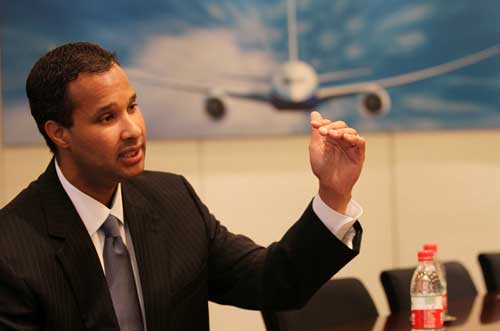China-US
Flying head first into the future
Updated: 2011-08-11 07:47
By Wang Zhuoqiong (China Daily)
|
Bertrand-Marc Allen, vice-president of Boeing International, and president of Boeing China, says the hill he has to climb is remarkable. Wang Jing / China Daily |
New Boeing China boss will not only take on Airbus but also domestic airplane makers
When David Wang, 67, retired earlier this year as head of the China unit of the US plane maker Boeing Co, it came as a surprise that a 38-year-old from South California was named as his successor to lead one of the company's key global markets.
Tall, easily mistaken for an NBA player, and engaging, Bertrand-Marc Allen, vice-president of Boeing International and president of Boeing China, also known as Marc Allen, has made a strong impression since he arrived in the country in March.
Industry experts have wondered whether the new leadership will bring changes to the industrial giant's strategy in the world's second largest aviation market after the US.
Although Boeing's airplanes account for about 60 percent of the aircraft operated in the country, its market share has dropped about 10 percent compared with that of 15 years ago, said Li Xiaojin, a professor at China Aviation University in Tianjin, despite the fact that its rival Airbus SAS entered China 13 years after the US aircraft maker did.
"Boeing has achieved many landmark performances in China, including the first flight to land on the Tibetan plateau, and has dominated fleets in Air China and China Southern Airlines, two leading air carriers," he said. "But it has also faced visible challenges from its European rival in recent years."
China, which is forecast by Boeing to spend $480 billion in purchasing 4,330 airplanes to meet the country's civil aviation demand over the next two decades, will continue to be the largest market outside the US, generating roughly $5 billion in annual turnover.
The country also plays an increasingly important role as a contributor to Boeing's global production system for its aircraft, with relationships with dozens of Chinese component suppliers and with some 6,000 workers in its parts and services subsidiaries and joint ventures.
In appointing Allen to such a key market, the chairman, chief executive officer and president of the US' largest exporter, Jim McNerney, said the move does not signal any fundamental change of Boeing's business strategy in the country. The company will continue to deepen and broaden its engagement with China.
But "it does represent a shift in people strategy for our company", McNerney said during a recent visit to the country, shortly after Allen's appointment.
"The Chinese market is as important, and eventually may well be even more important, than the US market. The people who will lead our company in the future have to have personal experience in China."
McNerney does not hide his expectations of Allen. "If he continues to do well, he will be part of the senior leadership of the company," he said.
Having lived with his academic parents in France for a time as a little boy, Allen fast learned how wonderful different parts of the world are. When he heard of his appointment, the first impression that came to his mind was just "raw excitement". Now, he is witnessing firsthand the strong display by China of its economic development, even as the rest of the world economy has been struggling over the last few years.
"I think the last few years have shown the important role China has to play in all of our businesses and how much the future is here," Allen said. "I am stepping into this role just as this realization is sinking in in the West. This is the future of business. This is the place to be."
Prior to this appointment, Allen, the Yale Law School and Princeton summa cum laude graduate, served as vice-president of global law affairs and general counsel to Boeing International, leading the company's international legal practice since its inception in late 2007.
His experience in supporting critical strategic partnership and customer agreements, from Asia to the Middle East and Europe over the last few years, has earned him the credit and trust to run the company's business in a critical market such as China.
Shep Hill, president of Boeing International and senior vice-president, business development and strategy, to whom Allen reports, said: "He has been incredibly effective in bringing a global perspective based on mutual understanding to the often too rigid exchange that lawyers from different countries have.
"In Beijing, that ability to build trust and long-term collaboration with key partners and stakeholders will be invaluable."
Now traveling back and forth between Seattle and Beijing, Allen said explanation and trust-building is vital in his job.
"On the one hand, part of my job is to explain Boeing to China, and the other part is to explain China to Boeing," he said. "The translation is really important and vital.
"The more that our executives in Seattle understand what China is doing and what we are doing in China, the better we are able to do in the market place."
Speaking of his prior role, Allen said he spent lots of time working with governments around the world and has seen similar issues to those he faces in China. "In China the government decisions really influence the business on the day-to-day rhythm," said Allen.
He recognized a nice overlap between his old job and the new job, including "to think through how the government regulatory system impacts what we do, and how we can maximize our ability to operate well and efficiently in the way that fits the expectation of the government".
He believes in a "step-by-step approach, with great respect and listening ears to China's core commitments".
"If I am listening more than I'm talking, I am doing the right thing, and I'm doing a good job," he said.
Drawing on his international experience, Allen said he was particularly impressed by the way China executes its policies in support of its goals.
"I haven't seen anything like it," he said. "Nowhere in the world does the policy so quickly materialize into positive action.
"China is developing the world's second largest airspace market and is doing it in the blink of the eye. It is easy to connect with those responsible for this great progress because they are also excited about the role they are playing in the transition."
Before Boeing, Allen was in private practice in Washington D.C. with the Kellogg Huber law firm. He also worked for the government as a United States Supreme Court Justice's law clerk. Prior to law school, he spent five years in the business world as a strategic consultant for a small start-up company.
The son of two professors, including a father who specialized in public policy studies, Allen has always had a passion for both business and law.
But it is the job with Boeing China that has truly offered him the opportunity to combine the two different interests seamlessly.
"I have found an incredible balance in my daily work, dealing with politics and government, which is about law and the real-world expression of law, while also making decisions on marketing strategies and risk and reward," he said.
He is aware of the weight of his new position.
"The work Boeing does has a role in the commercial relationships between nations. My role thus offers a unique opportunity to be someone who can help facilitate that dialogue between our two great nations," he said. "It is an incredible honor."
Having only been here for a few months, Allen understands well the challenges ahead of him.
"The hill I have to climb is remarkable," he said. "It is not just the ordinary question of how to run a big business, but I also have to learn a new culture, to absorb an array of new interactions with the market here, to learn a new language and new relationships on all sides."
In the basic calculus of any business venture, one of the key questions is what is the right risk to take, he said.
"For Boeing China, that means what to invest in, and what not to invest in," he said.
For Boeing, its investment in China continues to grow rapidly. Just this past April, the company doubled the production capacity of its plant in Tianjin, which manufactures composite components for Boeing aircraft.
But above and beyond manufacturing, Allen said, it is crucial to develop innovation in partnership with China in a way that has great mutual benefit attached to it.
Boeing's investments in innovation in China are in broad forms, involving research initiatives across the country with different partners. Current research efforts include studies on advanced material for seats, alternative fuels and interior designs.
He mentioned biofuels as an example of sustainable aviation energy. This January, Air China and Boeing signed a Memorandum of Understanding to hold the first trans-Pacific flight powered by sustainable aviation biofuel.
The company will also open in 2012 the China Aviation Industry Corp (AVIC)-Boeing Manufacturing Innovation Center in Xi'an to provide advanced instruction and laboratories for AVIC workers, followed by training in AVIC factories that make parts for Boeing's commercial airplanes.
But, Allen said, the company also continues to listen carefully to China, exploring whether there are points of mutual benefit into which Boeing may want to dive even deeper, so as to further differentiate itself from its competitors.
"It is out there," he said. "We want to find points of innovation where we can create something together, Boeing with China."
Added challenges include the emergence of China as another large plane maker. The Shanghai-based Commercial Aircraft Corp of China Ltd, or COMAC, is expected to launch its first commercial aircraft C919 - a rival to the Boeing 737 and the Airbus 320 - in 2014, and to make its first delivery in 2016. It is hoped the move will lessen the country's dependence on foreign aircraft manufacturers. Industrial analysts believe the airplanes made by COMAC might not rival the two established overseas companies, but will dilute the low-end market share in the future.
"This is a really dynamic moment in the market place," Allen said. "We recognize the duopoly between Boeing and Airbus in the market is coming to an end."
Welcoming the global opportunities and competitive challenges, Boeing looks for programs that can cultivate collaboration with COMAC in places where the two can "promote important industrial issues, grow the industry bigger and develop the market for everybody", he said.
China Daily

Specials

Star journalist leaves legacy
Li Xing, China Daily's assistant editor-in-chief and veteran columnist, died of a cerebral hemorrhage on Aug 7 in Washington DC, US.

Beer we go
Early numbers not so robust for Beijing's first international beer festival

Lifting the veil
Beijing's Palace Museum, also known as the Forbidden City, is steeped in history, dreams and tears, which are perfectly reflected in design.
